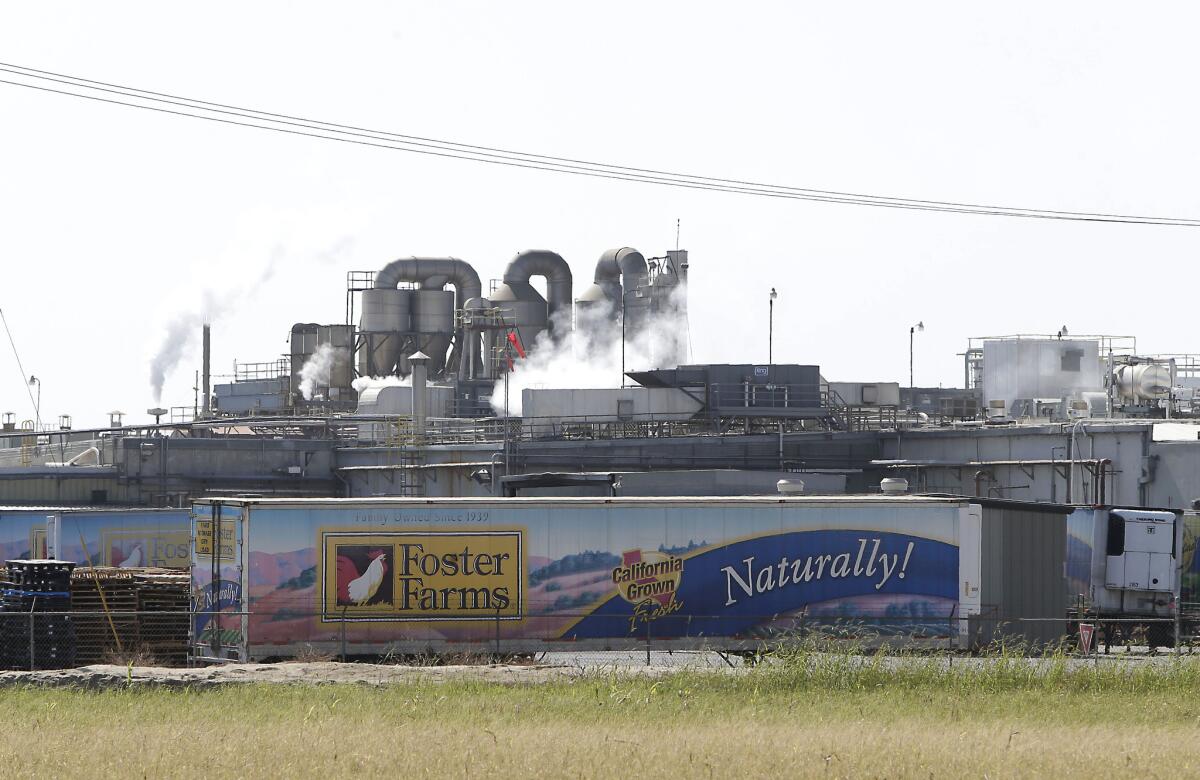After 8 workers die of COVID-19, officials want Merced County Foster Farms plant closed

- Share via
SAN FRANCISCO — The site of one of California’s worst coronavirus outbreaks has been a Foster Farms poultry plant in the Central Valley. And now, officials want the processing plant shut down.
Eight workers at the Foster Farms Livingston Facility have died — representing 18% of the COVID-19 death toll in Merced County among people under the age of 65. At least 358 employees have tested positive, Merced County health officials said in a statement.
Other Foster Farms facilities in multiple counties are also experiencing outbreaks, said Dr. Erica Pan, the acting state health officer.
“In view of increasing deaths and uncontrolled COVID-19 cases, the decision was made to order the Livingston Plant within the Foster Farms Livingston Complex closed until acceptable safety measures are in place,” Dr. Salvador Sandoval, the Merced County health officer, said in a statement late Thursday.
“Our charge is to protect the public’s health, even in the face of difficult decisions.”
Despite the public statement by Merced County officials, Foster Farms employees received emails late Thursday instructing them to show up to work for Thursday night’s shift or Friday if they were scheduled to do so.
“All active status employees should report to work for their regular shift tonight or tomorrow as scheduled. The plant and all other facilities on the Livingston complex are safely operating,” said the letter, which was reviewed by The Times. “Please continue to wear your face covering and follow other safe practices at work and outside of work.”
Later Thursday night, Mike North, a spokesman for Merced County, said enforcement of the shutdown order was delayed by 48 hours after the county received a call from the U.S. Department of Agriculture’s undersecretary for food safety.
The delay, North said in an email, will “help facilitate logistics associated with any necessary closure.”
In a statement issued Friday, Foster Farms did not address the shutdown order. Of the worker deaths, the company said: “We share the grief of their families and loved ones.”
Foster Farms said employee health and safety was one of its highest priorities, adding that the company is “an essential part of the national infrastructure.”
“Foster Farms’ comprehensive set of COVID-19 mitigations, promptly implemented following CDC guidance, can protect employees while they are on our premises, but we cannot fully protect them when they are exposed in the greater community,” the statement said. “While this context may provide some measure of understanding, we can never be complacent about employee illness or death.”
Foster Farms, based in Livingston, Calif., has described itself as the West Coast’s leading poultry producer.
The workers at the Livingston plant are predominantly Latino and Punjabi Sikh, said Deep Singh, executive director of the Jakara Movement, a Central Valley youth and family nonprofit aimed at the Punjabi Sikh community. Many of his group’s members work at the Foster Farms plant. Singh said he was disappointed by the decision to instruct workers to return to work in spite of the county order to shut down.
“I’m highly disappointed that Foster Farms would continue with tonight’s shift. That puts workers at danger and at risk of infection despite the expert medical opinions provided by county public health and other professionals,” Singh said on Thursday.
He recounted what one worker told him: “They call us essential, but they treat us as if we’re expendable.”
The county’s decision to order the closure of the sprawling facility comes two months after an outbreak was first identified there. In a statement issued publicly, Merced County public health officials said they had advised, and later directed, Foster Farms to conduct widespread testing among its employees.
But the testing ordered by the county has not been completed, county officials said, and deaths continue to climb and cases are increasing. On Friday, the company said it planned to complete testing of its employees later that day.
“The closure of this plant is the only way to get the outbreak at Foster Farms swiftly under control. Our hearts are with the eight families who have lost a loved one,” Sandoval, the Merced County health officer, said in a statement.
Of plant workers confirmed to be infected, 2.2% have died, according to the county. That’s significantly higher than the fatality rate among people infected with the coronavirus in the general population of Merced County, which is 1.3%.
County officials said they worked with the state attorney general’s office and the California Department of Public Health to reach an agreement with the company to avoid a full-scale closure of the production facility, but could not do so.
“If we’re going to keep food on our tables during this pandemic, we must do a better job of protecting the essential workers who are putting it there. That means standing up for the people in our poultry facilities, agricultural fields, meat processing plants, restaurants, grocery stores and more,” state Atty. Gen. Xavier Becerra said in a statement.
“Foster Farms’ poultry operation in Livingston ... has experienced an alarming spread of COVID-19 among its workers.”
Pan, the acting state health officer, wrote in a letter to an attorney representing Foster Farms that “by failing to comply with county directives, Foster Farms is not only jeopardizing the health of permanent, temporary and volunteer workers and their families, but also increasing the risk of community transmission in Merced County and surrounding counties, which are already experiencing very high levels of transmission.”
While the beginning of California’s coronavirus pandemic hit hard first in the Bay Area and then Los Angeles County, as the summer wore on the outbreaks have increasingly struck the rural agricultural regions of the state, infecting low-income essential workers who produce the food that feeds the country.
A Times analysis found that of California’s counties with the 12 worst per capita case rates over the last two weeks, eight of them are in the eight-county San Joaquin Valley. Merced County has the one of the worst rates statewide, reporting 565 cases per 100,000 residents in the last 14 days. By contrast, L.A. County has about 209 cases per 100,000 residents; San Francisco, 141 cases per 100,00 residents; and San Diego County, 116 cases per 100,000 residents.
Merced County also has one of the worst mortality rates among all counties over the last two weeks, reporting 38 deaths. On a per capita basis, that works out to 14 deaths per 100,000 residents; L.A. and Orange counties are reporting 5.5 deaths per 100,000 residents, and San Diego County and San Francisco, fewer than two deaths per 100,000 residents.
The Central Valley has the most animal slaughtering and processing industry jobs than any other region in California, according to an analysis by the UC Merced Community and Labor Center.
The region also has higher rates of investigations triggered by accidents or complaints, according to the center’s analysis of data provided by the U.S. Department of Labor. Between mid-2015 and mid-2020, the Central Valley was home to 65% of unplanned investigations of slaughterhouses and animal processing facilities in California, the UC Merced analysis found.
Businesses fear they’ll be blamed for COVID-19’s spread. They’re fighting for measures to protect them from lawsuits over infections, hospitalizations and deaths.
The center has urged officials to enact emergency workplace health and safety standard for the Central Valley’s animal slaughter and processing workforce. The Central Valley’s other big outbreaks have affected Central Valley Meat Co. in Kings County and Ruiz Foods, a frozen-food packager in Tulare County.
Meatpackers in California are particularly vulnerable in the pandemic era — the workers are low-income and live in tightly knit environments, said Edward Flores, a sociology professor with the UC Merced Community and Labor Center. Research by Flores and Ana Padilla, the center’s executive director, found that California counties with a greater share of low-wage and crowded households have been more likely to be hit hard by the pandemic.
Meatpacking workers in California are largely Latino, and Latinos have been disproportionately hit hard by COVID-19 in California. Across the state, Latinos account for 60% of cases and 48% of COVID-19 deaths, despite making up 39% of the population.
Latinos account for 56% of California’s low-wage workers, according to the UC Berkeley Labor Center, many of whom work in essential jobs in which they must leave home to work, raising their risk for infection.
Times staff writer Leila Miller contributed to this report.
More to Read
Sign up for Essential California
The most important California stories and recommendations in your inbox every morning.
You may occasionally receive promotional content from the Los Angeles Times.















